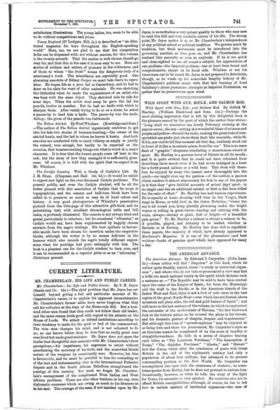C URRENT LITE RAT (IRE.
MR. CHAMBERLAIN: HIS LIFE AND PUBLIC CAREER.
Mr. Chamberlain : his Life and Public Career. By S. H. Jeyes. (Sands and Co. 16s.)—The chief problem that Mr. Jeyes has set himself, beyond giving a full and particular account of Mr. Chamberlain's career, is to explain his apparent inconsistencies. Mr. Chamberlain's former allies have never forgiven what they call his volte-face at the time of the Home-rule Bill. But a hun- dred other men found that they could not follow their old leader, and the same reason holds good with regard to his attacks on the House of Lords. We attack or defend institutions according to their tendency to make for the good or bad of the commonweal. The wise man changes his mind, and is not ashamed to do so; no one knows better than he does that no really great man ever lived but made great mistakes. Mr. Jeyes does not spare the faults that thoughtful men associate with Mr. Chamberlain's keen perceptions,—his impatience, his eagerness to retort without ascertaining the accuracy of his facts, and the somewhat brutal nature of the weapons he occasionally uses. However, his bias is favourable, and we must be grateful to him for reminding us of the tact and statesmanship that in the International Fisheries dispute and in the South African Rebellion strengthened the prestige of this country. Nor must we forget Mr. Chamber- lain's management of the complicated West Indian and West African problems. There are also other feathers in his cap, true diplomatic successes which are owing as much to his firmness as to his tact. The courage of the man, if not insisted upon by Mr. Jeyes, is nevertheless a very patent quality to those who may care to read this full and very readable survey of his life. The strong point Mr. Jeyes makes is as to Mr. Chamberlain's independence of any political school or political tradition. We govern much by tradition, but fresh movements must be introduced into the governing machine as time goes on, and Mr. Chamberlain has realised this necessity as soon as anybody. If he is too quick and clear-sighted to see all round a subject, his appreciation of one problem—the Imperial problem—has at least been broad and comprehensive, except on its fiscal side. Whether or not his views turn out to be sound Mr. Jeyes is not prepared to determine, though, as he winds up his somewhat lengthy history of Mr. Chamberlain's political career with that last warning of Lord Salisbury's about premature attempts at Imperial Federation, we gather that he preserves an open mind.






























































 Previous page
Previous page